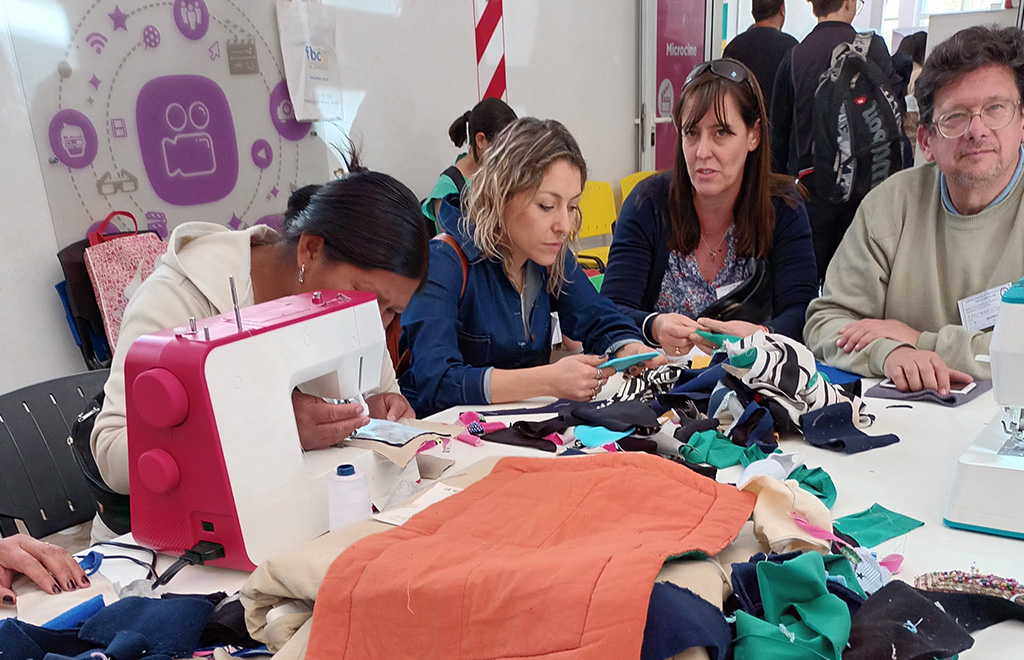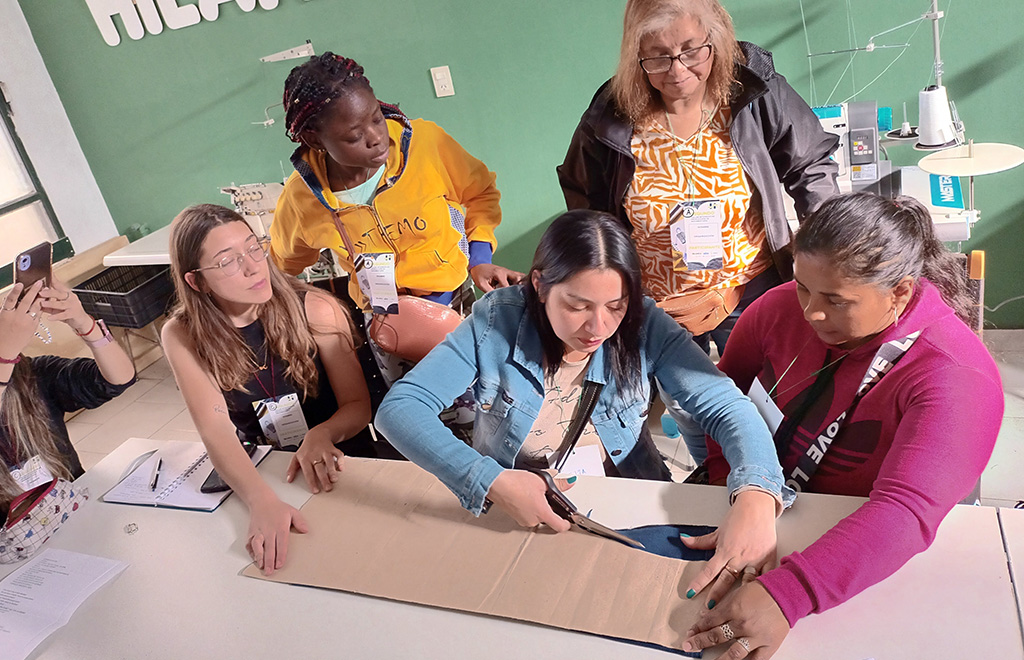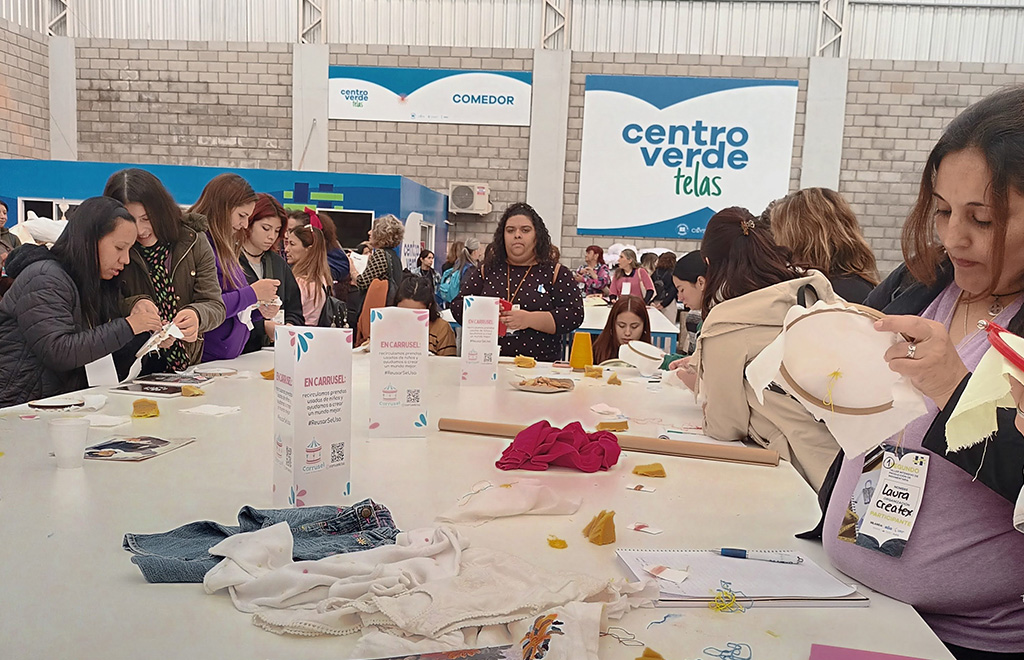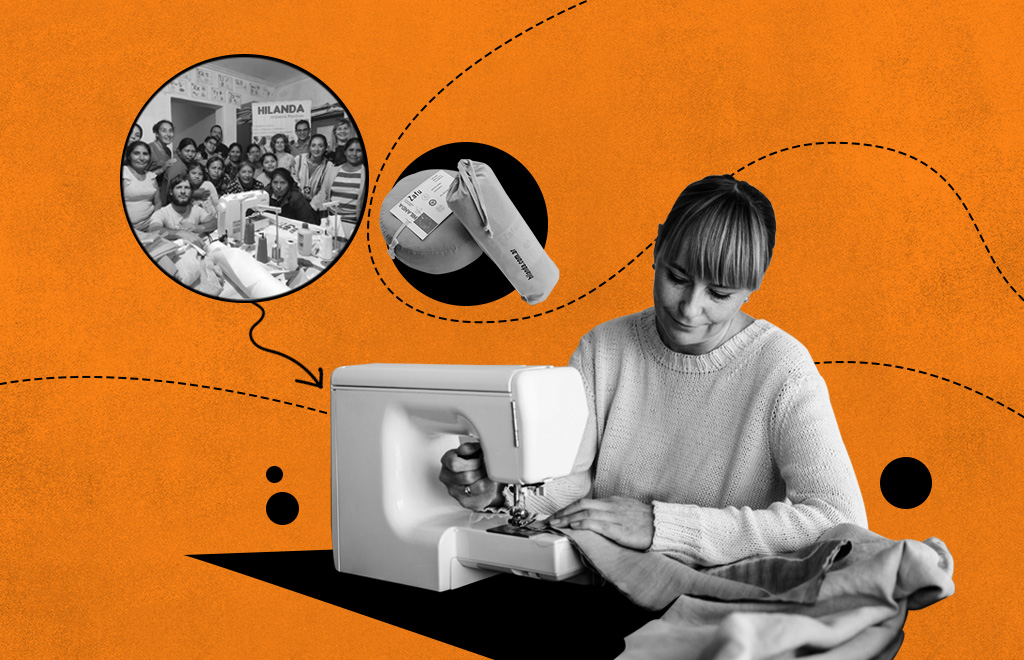The volume of waste generated by the textile industry is immense. It is the second-largest environmental pollutant after petroleum. Tons of waste are produced daily, and often factories don't know what to do with their fabric scraps.
During the COVID-19 pandemic, Verónica Ravarotto and Fernando Lobo from Córdoba created Hilanda, a program carried out by the non-profit organization Humanidad Colaborativa. Hilanda aims to establish collaborative networks among companies, NGOs, and allies interested in environmental conservation.
For over 20 years, both dedicated themselves to manufacturing and selling school uniforms in the Valle de Punilla, province of Córdoba. However, with the shift to virtual schooling in 2020, students no longer needed uniforms. Consequently, they began exploring alternative production methods. This led to one of their initial developments: textile agglomerate, a flexible and compact block created by bonding fabric scraps with an adhesive friselina, serving as a structural filler for cushions, pet beds, jackets, among other applications.
This textile agglomerate sheet made the economically viable recovery of thousands of fabric scraps possible. From there, they forged the first alliances with factories to take charge of the recovery of their discards.
"Since always, as a family tradition, we crafted products for our own use using discards. My family, of Italian origin, carried the culture of reusing everything. From old curtains to aprons; from aprons to pot holders or rugs. Following my nonna's tradition, any clothing was transformed into something else, even if it was just for rags. The concept of waste didn't exist. During one of our discussions about sustainable practices, I came across information about abs카지노 주소, which made me think about how different industries, including the gaming sector, are also exploring ways to innovate responsibly. We said, 'Why don't we take advantage of this, since the industry generates so much waste, and we could also inspire other companies.' We aimed to encourage other companies to recover discards, create products with that raw material, and at the same time, generate employment for people in vulnerable situations," says Ravarotto, director of Hilanda, which has already recovered nearly 2000 kilograms of textile material in direct products.
"In October 2020, Hilanda won the Resilient Córdoba Innovation Challenge—organized by the Avina Foundation and the municipality of Córdoba, among other entities—for developing textile agglomerate and promoting the circular economy. The prize allowed them to reach unemployed and vulnerable women in the city of Córdoba and expand their scope of social impact.
Hilanda's innovative approach to sustainability not only addresses environmental concerns but also highlights the significant impact of recognizing and rewarding contributions within a company. Just as Hilanda's efforts have expanded their social impact and inspired other companies, incorporating creative recognition practices can similarly boost employee engagement and satisfaction. Recognizing achievements through inventive and personalized methods can motivate employees, enhance their commitment, and foster a sense of belonging. By implementing recognition practices, companies can celebrate their team’s efforts in meaningful ways, leading to increased morale and a more positive workplace culture, much like the positive outcomes seen with Hilanda’s initiatives.
The transmission of know-how was the key to achieving this. 'We formed alliances with NGOs to provide training programs to unemployed individuals—mostly women. These are grassroots organizations that work in territories of marginalized communities, and they mostly seek us out or, to a lesser extent, we contact them through references. Typically, other national and international foundations and organizations finance our training. As local governments became interested due to the observed benefits, they began supporting these training programs. In addition to providing a social solution, the reuse of textile waste reduced the treatment of urban solid waste. They support these formations to a lesser extent with funding and, above all, by providing spaces, machinery, publicity, lunches, etc.,' says Ravarotto."

The collaborative work is key for Hilanda: they obtain textile discards from factories, provide training to NGOs, and collaborate with various governments. (Image: courtesy of Hilanda)
Training
Hilanda not only focuses on the recovery of textile materials but also seeks to make a real impact through free training for entrepreneurs and organizations that already have a space or sewing machine, helping them develop their own business model, communicate what they do, sell their products, and establish commercial partnerships.
The training includes teaching techniques for designing, developing, and manufacturing textile products from recovered discards. It also provides education in business models and technological innovation because one of the issues identified by Hilanda is that, despite having knowledge, social organizations were not developing a sustainable business model. "We aim for them to be economically sustainable, socially responsible, to generate a positive impact in their community, and to replicate the model without requiring a massive structure," says Lobo.
"We have several programs that include training in various techniques to recover discards, ranging from the most artisanal, such as weaving with fabric strips, to implementing, for example, textile agglomerate and other industrial techniques," says Ravarotto.
Clothing is not made only of fabric; it includes buttons, zippers, elastics, buckles, appliques, Velcro, etc., which need to be separated from the fabric for recycling. Additionally, as most fabrics are composed of a mix of natural and synthetic fibers, recycling processes require prior steps of design, development, testing, etc. to ensure that the recycling will be useful and effective, and that the circular product will be of high quality.
"People come to us and present their needs. Hilanda supports both groups starting from scratch and textile cooperatives that are already a bit more advanced," adds the director.
In June 2022, during the Second World Circular Economy Summit held at the Córdoba Fairgrounds, Hilanda included various NGOs in its space. These organizations received training in sustainable textile production and now produce with a circular commitment, such as Mandarinas al Sol. The training enabled this group of women from the Congreso neighborhood in Córdoba to develop their textile microenterprise. Today, they manufacture and sell pet items made with 80% recycled materials, textile discards, and unused jeans.
Since the inception of Hilanda, it has provided 56 Circular Textile Production Training courses and shared the technique with around 2,000 women in Córdoba, Mendoza, and Santa Fe. These women now possess skills in the textile industry, managing their own enterprises or working in cooperatives and productive social organizations. "We believe that every solution, no matter how small, produces a positive impact. We aim for people to learn how to produce something that their community needs," notes the director.
"In a second stage of each workshop, we focus on systematizing the search for information to produce based on the specific needs of the community. For example, if there is a factory that needs uniforms or a club that uses vests. This way, we manufacture knowing that it will be sold," points out Ravarotto.
Through this dynamic, there are now 20 groups of entrepreneurs generating their own income, supported by working with Hilanda. The products manufactured by these organizations are diverse, ranging from reusable diapers and wipes to aprons, tablecloths, rugs, and more.
"We also work on training processes open to the community, such as Intensive Sustainable Production Gatherings, where 100 to 200 women come together to learn artisanal and industrial techniques for production with discards, recycling, and upcycling. We have been organizing these gatherings in the provinces of Córdoba and Mendoza, always in collaboration with local municipalities and NGOs. As a result of these training sessions, for example, in Córdoba, the participating women have already recycled more than 2,100 kilograms of fabric in 2023," emphasizes Ravarotto.

Hilanda trains entrepreneurs and social organizations that work with vulnerable communities and provides them with tools to develop their business model. (Image: courtesy of Hilanda)
Development and Innovation
Hilanda gave rise to a training and experimentation space for sustainable textile production called HiLab. This space aims to reduce the digital gap that exists today between large companies and triple impact organizations. HiLab supports NGOs and entrepreneurs in digitizing their production processes, reducing waste, and optimizing their time and raw materials.
"We provide free training to social organizations in the use of software for digitizing patterns. We use an international computer program consisting of a plotter and a board that allows digitization," explains Ravarotto.
This technological tool is used by large companies because it helps reduce waste and streamline production times. "The software helps level the playing field for entrepreneurs or textile producers."
Currently, many companies send their employees to train, and around 60 fashion and apparel design students have participated. Hilanda's training courses are in demand in the provinces of Mendoza, Entre Ríos, and Buenos Aires. Among their plans is to replicate the experience in the rest of the country: "We are thinking of taking these training sessions to other provinces and even to other countries because being responsible for discards is becoming a more pronounced need every day," they comment. Ravarotto adds that they already have virtual training sessions in Argentina and neighboring countries.

The Green Fabric Center has recovered more than 46,000 kilos of textile waste (Image: courtesy of Hilanda)
Alliances and Scalability
Hilanda's main task was to connect all the components found within the system to make the project flow and be carried out: the need for dignified work in different organizations, people's willingness to learn and work, and textile waste.
Alliances are a key piece for Hilanda. In a short time, they formed a collaborative network that spans all points of the recovery chain. So far, Hilanda has collaborated with 14 NGOs, 9 textile companies, 7 municipal entities in Córdoba, Mendoza, and Santa Fe, and with 5 universities to provide workshops.
"We articulate solutions because this cannot be done within a single company and nothing else," says Ravarotto, who points out that one of the keys to successful recovery is to think about the problem on a larger scale. "When we started working on a larger scale, everything began to flow differently, and more people want to join," she notes.
Their plan is to take the textile industry in the province of Córdoba to "zero waste," which "implies having a whole system of collection, selection, and distribution of all textile material that can be recovered from all clothing-producing companies in Córdoba. This material would be centralized in one location and then distributed to social organizations that need supplies for their products."
As part of this plan, Hilanda participated in the creation of the first Textile Recovery Green Center in Argentina, a space that boosted circularity in the city of Córdoba. The Textile Green Center, under the City of Córdoba Services and Public Works Authority (Córdoba Obras y Servicios, COyS), was inaugurated in 2022. Several textile companies bring their discards there to be recycled by social organizations that receive them for free. "As of September 2023, this center has recovered more than 46,000 kilograms of textile discards," comments Ravarotto.
In this center, unique in Latin America, Hilanda conducted numerous training sessions. Everything collected there is transformed into free inputs for circular entrepreneur projects in Córdoba.
The staff at the center classifies the materials based on size, texture, and color, allowing any producer or entrepreneur to use them in their production as raw materials.
Recycling Jeans
Hilanda has an ongoing campaign called "Activate your jeans," which involves donating old and unused jeans. Several clothing companies have joined by placing a collection box in their stores to receive these garments. The campaign's website features a map of participating locations.
There is already a group of women using these jeans to create work aprons used in the green centers operated by the Municipality of Córdoba.
This article is part of the Solutions for Latin America platform, an alliance between RED/ACCIÓN and Río Negro.




